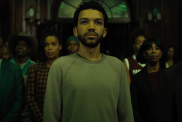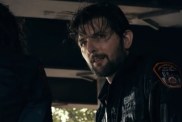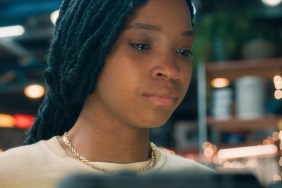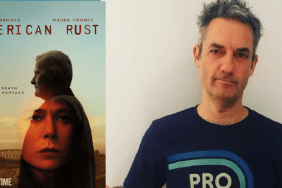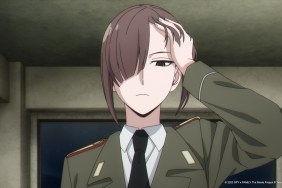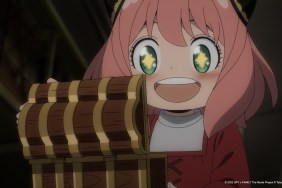Ever since LCD Soundsystem first appeared on the New York music scene in 2002 with the underground dance track “Losing My Edge,” their frontman James Murphy has been somewhat of an enigma. That was compounded after the release of their third album “This is Happening” when Murphy announced LCD Soundsystem would be calling it quits, not for any of the usual personal creative differences but just because it seemed like the right time to move on.
They announced one final show at New York’s Madison Square Garden, which sold out instantly on Ticketmaster – mainly to scalpers wanting thousands of dollars per ticket, much to the consternation of both Murphy and the group’s fans. (Not to boast, but the writer of this feature was there, having scored a ticket via Ticketmaster mere hours before.)
Along came directors Will Lovelace and Dylan Southern, the men behind the Blur documentary No Distance Left to Run, who offered to document that final concert as well as the period leading up to the show and the day after as it started to sink in for Murphy that he would need to find a new project. The result was Shut Up and Play the Hits, an introspective concert-slash-documentary that premiered at the Sundance Film Festival back in January and will have a one-night-only theatrical release on July 18.
Back in January, ComingSoon.net had a chance to sit down with Murphy and the filmmakers after the film premiered at Sundance. Because this interview was part of a cattle call of interviews Murphy and the duo were doing that day, we only got ten minutes, not really enough time to get too in-depth about the band or film unfortunately. Before we began the actual interview, we did talk about the fact we were able to get a ticket for the show mere hours in advance, and we learned that the venue had reserved a ridiculous amount of space for the sold-out show for the production’s cameras, thinking they were going to need large cranes, etc. When it turned out they didn’t need that space, more tickets became free, and Murphy also that they moved the stage back twice and made the stage smaller twice to get more seats into the venue.
ComingSoon.net: I heard a little bit about how this came about at the Q ‘n’ A last night, but you guys were already interested in making a movie about LCD Soundsystem before James announced the band was coming to an end, right?
Dylan Southern: Yeah, we’d had a couple tentative conversations.
James Murphy: Did it come out of the BBC at first or something weird?
Will Lovelace: Yeah, someone there set up an initial meeting and there was some kind of project was going to happen and the possibility of a BBC arts program or something like that, a much more traditional documentary.
CS: Similar to the Blur movie?
Lovelace: I guess that’s sort of where other people were thinking but we
Southern: It became very apparent that wasn’t the type of film that was right or that any of us wanted to do.
Lovelace: Early on, we all thought we should make something kind of close to what we ended up making.
CS: How did they approach you about making this movie and did they already know it was going to be about the last show or last day?
Murphy: We were all shy enough that mostly we went to meetings and other people talked to each other. It’s true. It was other people having conversations
Lovelace And we didn’t say anything and then
Southern: And whatever it was, it was going to be great so…
CS: Had your last album already come out at this point?
Murphy: Oh, yeah, yeah.
Lovelace: You were touring at that point.
Murphy: Yeah, we were on tour. It was after Glastonbury, so it probably late summer, like August 2010.

CS: When you figured you were going to do this last show at MSG, was it automatically decided that’s what the movie was going to be about?
Southern: There was always a performance component to it and I think in the very initial stages of the idea there was talk
Murphy: That there’d be no performance.
Southern: Yeah, there was and then there was talk of there being some kind of set-up performances prior to MSG. This movie changed so many times round then, it’s kind of hard to
Lovelace: We always had the intention of making the film about why you would quit a band, why stop? And then Madison Square Garden, that final show solidified the idea, and now it makes sense and there’s a point to the film.
Murphy: But without it being a VH1 “Behind the Music” Q n’ A to the bottom of it.
CS: It’s interesting you bring that up because part of the movie is an interview you do with the music journalist, which I assume was before the MSG show. I was curious why you decided to do that and use that as the narrative of the film and how that came about?
Southern: Yeah, it was never going to be a talking heads biography. There was never going to be James up there telling the story of the band or any of the other band members. It was never going to be that kind of biography film but there was a need to get inside James’ head and the best way to do that was to experience it from the way you speak to journalists.
Murphy: Part of being in a band is talking about your music. It’s not a weird thing you place on the story. That’s what being a band is.
CS: Just like being a filmmaker. At whatever point you finish making the movie, you’ll eventually do interviews.
Southern: Exactly, so it seemed like a more honest way of accessing that kind of heart of the story without setting it up.
Lovelace: And Chuck Klosterman, we’d read interviews he’d done before with James, and it seemed like he wouldn’t ask all the obvious questions and it seemed it might be quite an interesting experience.
Murphy: Yeah, and then you gave him an assignment the way a magazine would. It was like giving an assignment the same way you would a magazine to a journalist. “Hey, this band’s quitting and they’re doing a last show at Madison Square Garden, Can you go and do an in-depth interview?” It’s as if he was going to have a 20-page slot.
Lovelace: The interview ran on for three or four hours, as long as the show was.
CS: So you weren’t just filming an interview you were doing with him for another magazine, this was an exclusive thing.
Murphy: No, which would have taken a lot of the steam out of the movie because that’s the magazine. In a way, that’s where that information lives.
CS: Do you feel this movie is a good introduction to LCD Soundsystem for people who have never heard the music or do you think it’s really more for people who already know your music and are fans?
Southern: Yeah, I do think so, and for the reason that might not seem obvious. It doesn’t have that biographical element and there is a minimum of exposition, but what we wanted to make was a film that had a very strong narrative. You know that this is a band and you know that they’re playing a huge show, and then the other part of it is this contrasting scenario of James the following day. I think there’s enough there to pull an audience in without having to kind of spoon-feed them.
Murphy: Yeah, I just watched “Drive” on the plane and you don’t know anything about that guy. You don’t ask that because it’s not a real person, but I thought it was a very good instinct early on with these guys is to just like not worry about that. I agree, but you can Google if you want to find out (more about the band). If you care about the band then you already know half this sh*t anyway, so there’s no point because it’s not like something to enshrine the band, it’s much more about making a story, a movie, not a thing about a band but a movie then the story of the movie is the band. The movie is the object, the band.
CS: Which is interesting because usually movies like this are used as part of promoting a band or their new record.
Murphy: Right. This was just to make the best movie that could get made for people about that story.
Lovelace: Yeah, we liked the story and that was the idea. It wasn’t “Let’s make sort of the definitive LCD history film.” We never wanted to do that.
Murphy: It would just always be compromised.
Lovelace: Yeah, and not as interesting.
Murphy: Yeah, who cares?

CS: How did you guys prepare for the MSG show because it really feels like you have cameras everywhere. I was at the show and I don’t remember seeing any cameras anywhere.
Murphy: Shoulder cameras, man.
Lovelace: Yeah, we got ten really good DPs, people who don’t shoot concerts usually, just for movies.
Southern: The thing you’d get if it was camera operators who regularly work at shows at MSG was that those guys do it all the time and are probably bored of their jobs and they’re shooting in a very functional way, whereas with this.
Murphy: More professional.
Southern: Yeah, exactly. We wanted to see their experience of the show so we found them on, “This is all about capturing the atmosphere and documenting a moment rather than taping the show.
Murphy: And inventing a way of shooting the concert. The concert movies people care about are the ones where they’re inventing the process so it’s much better to have people for whom they’re inventing it. Like Spike Jonze is inventing it for himself, and these are just great cinematographers rather than having rock cinematographers, which makes it much more interesting.
CS: I saw Spike’s name on there and was really impressed. Since the movie was shot over 48 hours, how long did it take to go through everything you had to get it ready to edit it together?
Southern: An incredible amount of time because not all our cameras’ sync boxes worked. We had 13 main cameras, each with 4 hours of footage and then an incredible amount of footage aside of that.
Murphy: And a hundred tracks of audio for four hours
plus camera audio.
Lovelace: It was quite a process.
CS: Did you use the earlier Terminal 5 shows as preparation?
Southern: We went to see one but…
Lovelace: It was to enjoy the show rather than work and then went to shoot Madison Square Garden. They weren’t shot.
CS: I know you were deliberately trying to avoid making a talking heads movie but you never hear any of the other members of the band talk, which surprised me, because I’m always curious about the personalities of the other band members.
Murphy: The main talking for me is the interview and then backstage, it just goes back and forth between the people, so then you’d hear Nancy or Pat, but Pat doesn’t really like to talk very much, as is evidence by what he says, which is sort of like, “I’ll try and enjoy this.” The interview was just with me, which is a better document of the band, because in reality, I did almost all the interviews. That’s just the story of that band and it would be really weird to .. it would have to be a talking head thing.
Lovelace: I think it then would not be the film we made at all. Then it would be closer to the sort of films we were discussing earlier…
Murphy: Let VH-1 do that.
CS: Do you generally keep in touch with the other members of the band as well?
Murphy: Yeah, Nancy’s here. Nothing has changed in our lives otherwise. This is just like during between tours except that it’s between tours forever.
CS: Thanks, guys. Well, I hope people have a chance to see the movie in theaters.
Southern: You should see it in the theater.
Lovelace: That’s very important to us because
Southern: It’s an experience.
Lovelace: Yeah, to see it on the big screen and to hear it and watch it with other people because you saw it last night and it was kind of a communion thing, wasn’t it?
Shut Up and Play the Hits will play for one night only in select cities on July 18, 2012, and you can find out where here. Many of the shows including two of the New York shows at the Landmark Sunshine have already sold out but they’re already adding more shows on July 26.
